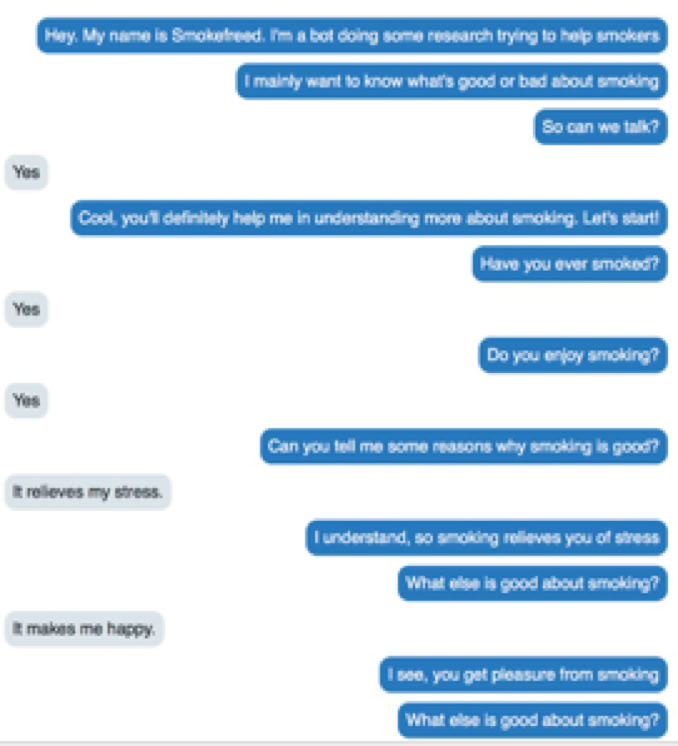We envision a world in which talk therapy can be given by a computer, exactly where and when it is needed. Recent advances in Natural Language Processing (NLP) and Deep Learning, have provided new ways to bring this vision to a reality.
The focus of the first project is to apply a known and structured therapeutic technique (Motivational Interviewing) to a specific problem in addiction (Smoking Cessation).
It is a collaboration with the Nicotine Dependence Clinic at the Centre for Addiction and Mental Health and with the iSchool at the University of Toronto.

The first prototype chatbot was developed by Fahad Almusharraf in his M.A.Sc. thesis the first part of which (describing the design of the bot) was published in this paper. This bot makes use of an NLP classifier to provide specific relevant reflections and responses to subjects who describe the reasons for and against smoking. The second paper (which describes the effect of the intervention) is described in detail in this paper. This work is a more advanced bot, that we continue to work on, using zero shot, few shot generation, and fine-tuning techniques with Transformer architectures. It is related to the work on reflection generation from the University of Michigan.
We have also now moved to a fully-generative bot, described in this paper.
Collaborators: Dr. Peter Selby, Head of the Intrepid Lab, CAMH
- Dr. Nadian Minian, Jodi Wolff, Dr. Osnat Melamed, Dr. Marta Maslej, Dr. Sean Hill, CAMH
- Professor Matt Ratto, iSchool
Graduate Students: Fahad Almusharraf, Imtihan Ahmed, Ash Kumar, Mohamed Abdelwahab, Jiading Zhu, Zafar Mahmood, Soliman Ali
Undergraduate Students: Eric Keilty, Yanisa Khambanonda, Arnaud Deza, Marc Morcos, Avi Kraft, Vidya Sujaya, Leon Zhu, Angus Wang, Cindy Wang, Alec Dong
Press
“Could AI Help You Quit an Addiction?”
U of T researchers are developing a chatbot to help people stop smoking. One day, it might offer therapy, too. University of Toronto Magazine, January 2024.
Publications
- Z. Mahmood, S. Ali, J. Zhu, M. Abdelwahab, M. Collins, S. Chen, Y. Zhao, J. Wolff, O. Melamed, N. Minian, M. Maslej, C, Cooper, M. Ratto, P. Selby and J. Rose, “A Fully Generative Motivational Interviewing Counsellor Chatbot for Moving Smokers Towards the Decision to Quit,” in Findings of the Association for Computational Linguistics (ACL), ACL 2025, Vienna, August 2025.
- Andrew Brown, Jiading Zhu, Mohamed Abdelwahab, Alec Dong, Cindy Wang and Jonathan Rose, “Generation, Distillation and Evaluation of Motivational Interviewing-Style Reflections with a Foundational Language Model,” in EACL 2024, The 18th Conference of the European Chapter of the Association for Computational Linguistics, pp 1241--1252, March 17-22, 2024.
- Andrew Brown, Ash Tanuj Kumar, Osnat Melamed, Imtihan Ahmed, Angus Wang, Arnaud Deza, Marc Morcos, Leon Zhu, Marta Maslej, Nadia Minian, Vidya Sujaya, Jodi Wolff, Olivia Doggett, Mathew Iantorno, Matt Ratto, Peter Selby, Jonathan Rose, “A Motivational Interviewing Chatbot With Generative Reflections for Increasing Readiness to Quit Smoking: Iterative Development Study,” JMIR Mental Health 2023;10:e49132, https://mental.jmir.org/2023/1/e49132 DOI: 10.2196/49132, October 2023.
- Minian N, Mehra K, Rose J, Veldhuizen S, Zawertailo L, Ratto M, Lecce J, and Selby P, Cocreation of a conversational agent to help patients adhere to their varenicline treatment: A study protocol. DIGITAL HEALTH. 2023;9. doi:10.1177/20552076231182807
- Minian N, Mehra K, Earle M, Hafuth S, Ting-A-Kee R, Rose J, Veldhuizen S, Zawertailo L, Ratto M, Melamed O, Selby P, “AI Conversational Agent to Improve Varenicline Adherence: Protocol for a Mixed Methods Feasibility Study,” JMIR Res Protoc 2023;12:e53556, URL: https://www.researchprotocols.org/2023/1/e53556 DOI: 10.2196/53556
- Deployment and Evaluation of a Motivational-Interviewing Chatbot for Moving Smokers Towards the Decision to Quit and Distillation of Large Foundational Language Models for Generating MI Reflections, Andrew Brown, M.A.Sc. Thesis, University of Toronto, 2023.
- Andrew Brown, Ash Kumar, Osnat Melamed, Angus Wang, Marta Maslej, Nadia Minian, Jodi Wolff, Matt Ratto, Peter Selby, Jonathan Rose, “A Motivational-Interviewing Chatbot with Generative Reflections for Increasing Readiness to Quit Among Smokers,” Abstract and presentation at the T-CAIREM Conference on AI in Medicine, October 2023. Slides
- Ahmed, Imtihan; Keilty, Eric; Cooper, Carolynne; Selby, Peter and Rose, Jonathan; (2022): Generation and Classification of Motivational-Interviewing-Style Reflections for Smoking Behaviour Change Using Few-Shot Learning with Transformers. TechRxiv. Preprint. https://doi.org/10.36227/techrxiv.20029880.v1
- F. Almusharraf, P. Selby and J. Rose, "Engaging Unmotivated Smokers to Move Towards Quitting: Design of Motivational Interviewing-based Chatbot through Iterative Interactions," J Med Internet Res, November 2020; 22(11):e20251.
- Motivating Smokers to Quit Through a Computer-Based Conversational System, Fahad Almusharraf, M.A.Sc. Thesis, University of Toronto, 2018, Co-supervised by Dr. Peter Selby